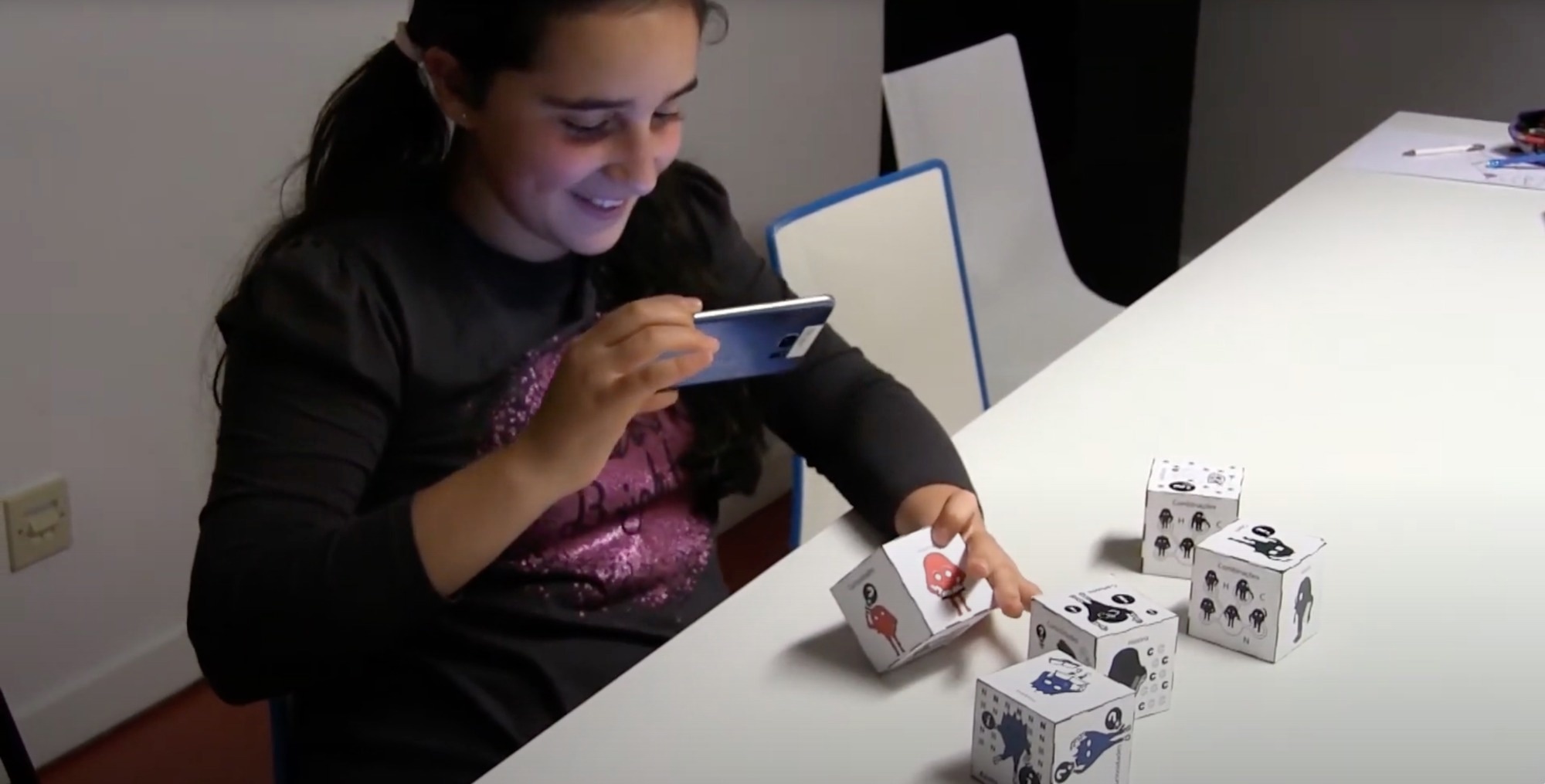
Girl playing Periodic Fable. Image Credit: Interactive Technologies Institute
The researchers disclosed their research outcomes on the efficiency and usage of the game to encourage the learning of chemistry and enhance the perception of the children about the subject.
The study targeted the problem of children’s view of chemistry as a difficult subject. This could result in poorer academic performance and a decreased interest in pursuing careers in STEM subjects.
The game, titled “Periodic Fable Discovery”, gives children scientific content assisted by an exploratory activity with the help of augmented reality and manipulable physical cubes. The game aims to distract children while engaging them with powerful storytelling about the Periodic Table and the basics of chemistry.
Children use smartphones to acquire information about a specific chemical element by pointing the smartphone camera to the cubes’ surface. Each face reveals text, audio, or animations about specific chemical element properties.
Sandra Câmara Olim, Study Leading Researcher, Interactive Technologies Institute
These outcomes were presented in February 2023 at the ACM International Conference on Tangible, Embedded and Embodied Interaction in Warsaw. Sandra Câmara Olim, a scientist at the Interactive Technologies Institute, heads the project managed by Valentina Nisi, Professor at Instituto Superior Técnico. The quantitative and qualitative outcomes of the study displayed considerable positive outcomes in the learning outcomes and engagement of the participants.
Children retained more information about Chemistry and the Periodic Table, leading to better performance in knowledge tests. Additionally, students shifted their perception of chemistry from a difficult and tedious subject to an interesting and useful one.
Sandra Câmara Olim, Study Leading Researcher, Interactive Technologies Institute
As a tool to encourage STEM education, the study encourages scientists to continue assessing this design system. The study offers knowledge about the design and development of AR game-based experiences with the help of an interdisciplinary method between human factors, learning content, and technologies to encourage children’s interest in chemistry.
Combining our technological know-how with teachers’ pedagogical skills allowed us to develop a fun interactive game that uses storytelling to create an emotional connection with children, thus improving their interest in the topic.
Sandra Câmara Olim, Study Leading Researcher, Interactive Technologies Institute
The game mechanics of the so-called “Periodic Fable” have been developed to occupy children learning about chemistry via storytelling, physical interaction with augmented reality, and manipulable cubes.
The game comprises an entertaining, interactive, and memorable learning experience for children, which can lead to better retention of knowledge and increased interest in the subject.
By using physical cubes, the game provides a tactile experience enabling children to manipulate and study the elements of the periodic table hands-on.
Further, augmented reality enhances the experience by the addition of a digital layer that overlays data and animations onto the physical cubes, thereby making the learning experience highly immersive and engaging.
The scientists plan to continue assessing the game’s effectiveness and design by performing additional studies having more participants and exploring the possible long-term effect of AR-based games on students’ persistence in science education and the development of spatial skills.
The “Periodic Fable” project is part of Sandra Câmara Olim’s doctoral research. The set of AR-based educational games is targeted at children aged from 9 to 13 years. This consists of various pedagogical methods to streamline the assimilation of academic ideas in a playful and fun approach.
The scientists believe this research will have a long-lasting effect on society by offering knowledge about the design and development of AR-based games to encourage STEM education.
Periodic Fable
Video Credit: Interactive Technologies Institute
Journal Reference
Olim, S. M. C., et al. (2023) “Periodic Fable Discovery” Using Tangible Interactions and Augmented Reality to Promote STEM Subjects. Proceedings of the Seventeenth International Conference on Tangible, Embedded, and Embodied Interaction. doi.org/10.1145/3569009.3572804.